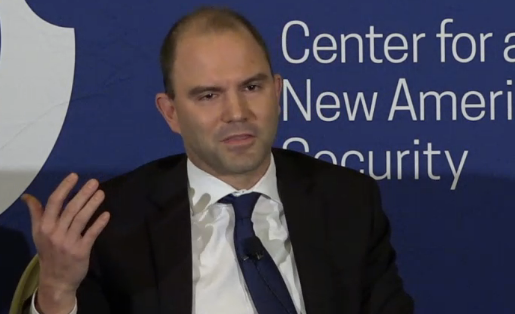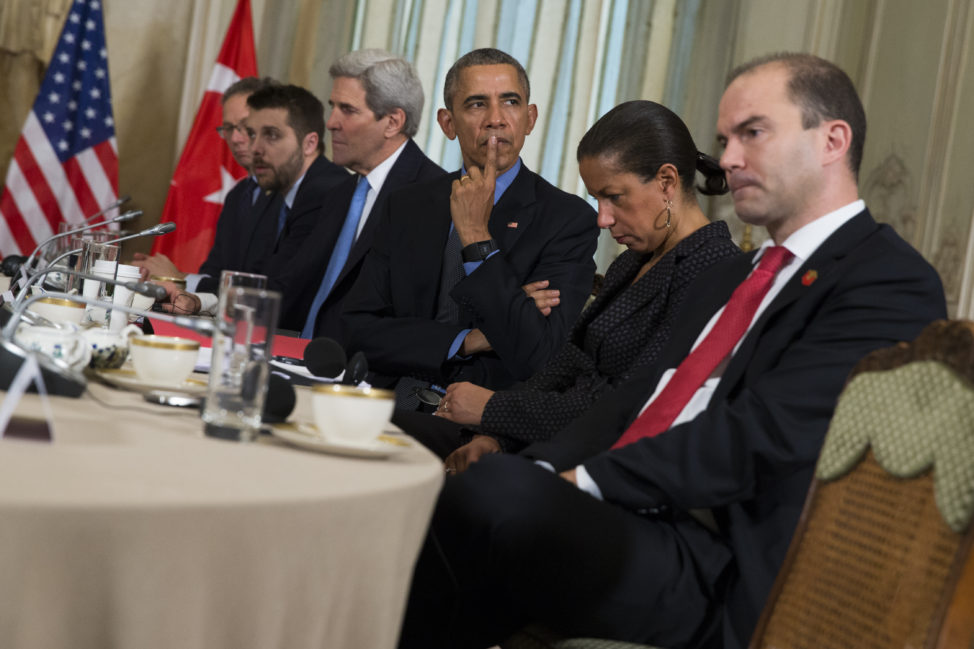Ben Rhodes was a no-show at a congressional hearing that was ostensibly about him.
Rhodes, the Deputy National Security Adviser for strategic communications, is described in a controversial New York Times Magazine profile of him as “the single most influential voice shaping American foreign policy” aside from President Obama.

Ben Rhodes speaking at an event at the Center for a New American Security May 17, 2016 (Screen shot)
The passages drawing the most attention center on the nuclear deal with Iran. The profile reveals that the White House spun a narrative that the deal came about in 2013, when “moderates” came to power in Iran when in fact, “the most meaningful part of the negotiations” took place in 2012, months before the election of President Hassan Rouhani.
Republicans on the House Oversight Committee criticized Rhodes for how he managed the White House campaign to sell the deal to Congress and the media. Committee Democrats pointed out the Bush White House engineered a similar campaign about Iraq’s weapons of mass destruction. In a letter to President Barack Obama, three U.S. senators called for him to fire Rhodes.
When voters select a presidential candidate on election day, they’re not necessarily thinking about the hundreds of people who will fill key advisory positions behind that candidate. And when the spotlight catches one of those generally anonymous presidential loyalists, it begins one of Washington’s favorite parlor games: Is the President being well served?
Ben Rhodes skipped the invitation to appear before the Congressional committee, but he cannot avoid the political spotlight.
How We Advocated for the Iran Deal
Ben Rhodes – Medium
First, we never made any secret of our interest in pursuing a nuclear deal with Iran. President Obama campaigned on that position in 2008. We pursued several diplomatic efforts with Iran during the President’s first term, and the fact that there were discreet channels of communication established with Iran in 2012 is something that we confirmed publicly. However, we did not have any serious prospect of reaching a nuclear deal until after the election of Hasan Rouhani in 2013. Yes, we had discussions with the Iranians before that, but they did not get anywhere….
Second, we did aggressively make the case for the Iran deal during the congressional review mandated by statute last summer, as it was imperative that the facts of the deal be understood for it to be implemented. Opponents of the deal had no difficulty in making their case — through commentary, a paid media campaign, and the distribution of materials making a variety of arguments against the deal. Tough and fair questions were raised; sometimes, there were also inaccuracies about the nature of the deal. Given our interest in making sure that any misinformation was corrected, and that people understood our policy, we made a concerted effort to provide information about the deal to any interested party…
Third, there was no shortage of good reporting and analysis — positive, negative, and mixed — about the Iran deal. Every press corps that I interacted with vetted that deal as extensively as any other foreign policy initiative of the presidency. A review of the press from that period will find plenty of tough journalism and scrutiny.
How the New York Times Magazine Botched Its Iran Story
Joseph Cirincione – Politico Magazine
Obama did not mislead the public about negotiations with Iran. Most of the talks the United States held with Iran under the previous, hard-line President Mahmoud Ahmadinejad were widely reported. Even the secret talks that opened up the engagement with the more pragmatic Rouhani government were disclosed by the dogged reporting of Laura Rozen and others well before the congressional vote last year. And the imagined plot to sell out our Middle East allies to Iran is a common talking point of the far right, without any supporting evidence.
But one of (New York Times reporter David) Samuels’ biggest fallacies is his claim that the world’s leading nuclear policy and national security experts were duped by Rhodes, the deputy national security adviser whom Samuels portrays as a digital Machiavelli spinning gullible reporters and compliant experts into accepting a bad deal….
In London, Paris, Berlin and Washington the deal was evaluated on its merits, not on spin. Nor did we wait for the White House to fire the starting gun. Ploughshares Fund, the group I head, began our campaign to shut down Iran’s paths to a bomb six years ago.

President Barack Obama, third from right, listens during a bilateral meeting with Turkish President Recep Tayyip Erdogan, in Paris, on Tuesday, Dec. 1, 2015. The leaders discussed the continuing crisis in Syria, and the fight against the Islamic State group. From left, Charles Kupchan, Senior Director for European Affairs, Brian Deese, Senior Advisor, Secretary of State John Kerry, Obama, Susan Rice, National Security Advisor, and Ben Rhodes, Deputy National Security Advisor. (AP)
Ben Rhodes Needs Some Fresh Air
Fred Kaplan – Slate
About a week ago, I told a friend that I didn’t understand how people like Ben Rhodes—who’s been working as deputy national security adviser since President Obama’s first day in the White House—could stand the nonstop pressure without going crazy. Then came David Samuels’ profile of Rhodes in the New York Times Magazine, and I wondered if he’d gone nuts after all….
Many have commented on the article as a fascinating, if gruesome portrait of how power works and how official narratives are woven in the age of Obama and social media. It is all that, but not entirely in the way that many bloggers and tweeters have inferred. It struck me as interesting in two ways: first, as a story of a senior staffer who has been hunkered down in a windowless West Wing office for too long; second, as the story of a freelance writer—David Samuels, the author of this piece—who has an ideological agenda to push and who hides it by hyping the importance of the man he’s profiling.
Ben Rhodes addressed the Center for a New American Security Tuesday afternoon. His invitation to appear before the House Oversight Committee’s hearing on The White House Narrative on the Iran Nuclear Deal was declined by the White House, citing “significant constitutional concerns.”
Did the New York Times Accidentally Tell the Truth About the Obama Administration?
Patrick L. Smith – Salon
In Ben Rhodes we seem to see the blurring of the line between the substance of policy and the narrative of the policy—its “story.” The flack and spinmaster sitting at the summit table tells us something fundamental about the Obama presidency and why it has been so hard a read in the foreign policy space. This is what I hope the historians do not miss.
I do not doubt that Rhodes and Obama shared the ambition to effect “a radical shift in American foreign policy.” But they have misread the task top to bottom. Their project has been all about style, in a word. This president and his great communicator set out to change the way America does things abroad but not the intentions of what we do.
Ben Rhodes Proves Obama Is About Story-Telling, Not Accomplishments
M.G. Oprea – The Federalist
This admission of crafting a narrative for political ends seems to confirm what I have argued in the past, that Obama is more interested in the story, the headline, and shaping his legacy than with the merits or success of his policies. He cares more about how it sounds on the news when the anchor announces “Obama has negotiated a nuclear deal with Iran,” than with the consequences of his actions, or the deceptions he used to get there.
This was true for his signature legislation, the Affordable Care Act, which Obama and Democrats shoved through Congress by promising Americans there would be no hikes in premiums and if they liked their doctor they could keep their doctor. Both promises were, of course, blatant lies. But this has been Obama’s modus operandi for the past seven years: if it sounds good and will convince the people, Obama will say it.

